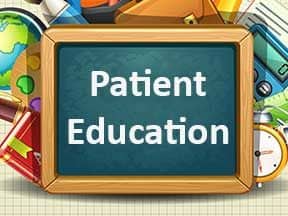Acute Necrotizing Ulcerative Gingivitis - Trench Mouth Acute Necrotizing Ulcerative Gingivitis (ANUG), which is also known as trench mouth or Vincent's Stomatitis, is a painful bacterial infection and ulceration of the gums. The term "trench mouth" comes from World War I, when the disorder was common
Read more
Patient Education
 Our patient education section is designed to enable you to learn more about dentistry and oral health related topics. The more we educate each patient, the more informed everyone is about their dental health. If there is a topic you want to learn more about that you don't find on our website, please let us know. You will find information ranging from what causes bad breath to how to read x-rays to oral cancer. Please click any of the links below to go directly to that page.
Our patient education section is designed to enable you to learn more about dentistry and oral health related topics. The more we educate each patient, the more informed everyone is about their dental health. If there is a topic you want to learn more about that you don't find on our website, please let us know. You will find information ranging from what causes bad breath to how to read x-rays to oral cancer. Please click any of the links below to go directly to that page.
- Acid Experiment
- ANUG Trench Mouth
- Bad Breath
- Bruxism Tooth Grinding
- Chemo and Your Mouth
- Conditions of the Tongue
- Dental X Rays
- Denture Care
- Dry Mouth
- Fluoride Experiment
- How to Brush
- How to Floss
- How to Read X Rays
- Oncology Guide
- Smokeless Tobacco
- Tooth Anatomy
- Tooth Sensitivity
- Toothpaste Ingredients
-
ANUG Trench Mouth
Category: Patient Information, Patient Education
-
Acid Experiment
Category: Patient Information, Patient Education
Acid Experiment This experiment simulates an acid attack on bones (bones are rich with calcium, just like your teeth). What you'll need: 2 clean chicken bones 1 container 1 bottle of white vinegar What to do: Pour several inches of vinegar into the container. Soak the clean chicken
Read more -
Bad Breath
Category: Patient Information, Patient Education
Bad Breath (Halitosis) Bad breath (halitosis) can cause embarrassment, create social and psychological barriers, and even affect relationships. Causes The majority of bad breath problems begin in the mouth. Bad breath that is of oral cavity origin can be traced to a sulfur compound produced
Read more -
Bruxism Tooth Grinding
Category: Patient Information, Patient Education
Bruxism (Habitual Grinding of Teeth) Have you ever been told that you grind your teeth? Tooth grinding [bruxism] is an oral habit which involves clenching and grinding of the teeth. It is not uncommon in our society. Approximately 50% to 96% of adults experience bruxism and 15% of children acquire
Read more -
Chemo and Your Mouth
Category: Patient Information, Patient Education
Chemotherapy and Your Mouth Are You Being Treated With Chemotherapy for Cancer? How Does Chemotherapy Affect the Mouth? What Mouth Problems Does Chemotherapy Cause? Why Should I See a Dentist? When Should I See a Dentist? What Will the Dentist and Dental Hygienist Do? What
Read more -
Conditions of the Tongue
Category: Patient Information, Patient Education
Conditions of the Tongue Hairy Tongue Hairy tongue is a benign change of the top surface of the tongue that is characterized by elongation of the many small nodules called papillae. It gets is name because the papillae resemble stubby hairs. The papillae can become stained from coffee, tea, colored
Read more -
Dental X Rays
Category: Patient Information, Patient Education
Dental X-Rays - Radiographs What is a Dental X-Ray? The term x-ray is actually referring to the radiation that is used to make the image on the film. The radiograph or picture on the film is the resultant picture that we see. A radiograph is an extremely important diagnostic tool. These pictures
Read more -
Denture Care
Category: Patient Information, Patient Education
Denture Care Just because you may have dentures does not mean that you can ignore your oral health and hygiene. It is still important to seek regular dental services for evaluating the soft tissues and to examine the denture for proper fit, comfort, and function. Why should I clean my denture daily? Daily
Read more -
Dry Mouth
Category: Patient Information, Patient Education
Dry Mouth What do I need to know about dry mouth? Everyone has a dry mouth once in a while--if they are nervous, upset or under stress. But if you have a dry mouth all or most of the time, it can be uncomfortable and can lead to serious health problems. Dry mouth... What is dry mouth? Symptoms
Read more -
Fluoride Experiment
Category: Patient Information, Patient Education
Fluoride Experiment This experiment simulates the protection power of fluoride. What you'll need: 1 bottle of fluoride rinse 2 eggs 1 bottle of white vinegar 3 containers What to do: Pour four inches of fluoride rinse solution into one of the containers and then place an egg
Read more -
How to Brush
Category: Patient Information, Patient Education
How to Brush Brushing is an essential part of the tooth-cleaning process. Brushing removes plaque from: the chewing surfaces the cheek and tongue sides of teeth at the gumline, where periodontal disease often begins Most people tend to brush too hard so we strongly advise the use of
Read more -
How to Floss
Category: Patient Information, Patient Education
How to Floss Flossing is an essential part of the tooth-cleaning process because it removes plaque from between teeth and at the gumline, where periodontal disease often begins. If you find using floss awkward or difficult, ask us about dental floss holders or interdental cleaning devices that are
Read more -
How to Read X Rays
Category: Patient Information, Patient Education
How to Read X-rays Dental x-rays enable us to see inside a tooth. This quick guide shows you some of what we see and what we are looking for. This is an x-ray of the back teeth on the upper arch. With x-rays, you can only see the hard tissues, such as the teeth and bone but you cannot see the
Read more -
Oncology Guide
Category: Patient Information, Patient Education
Oncology Reference Guide to Oral Health Head and Neck Radiation Therapy Pre-Cancer Treatment Oral Health Examination Chemotherapy Oral Complications of Cancer Treatment Blood and Marrow Transplantation Head and Neck Radiation Therapy Patients receiving radiation therapy to the
Read more -
Smokeless Tobacco
Category: Patient Information, Patient Education
The Facts About Chewing Tobacco A lot of athletes get hooked before they know the facts about dip and chew. They don't know that spit tobacco: is highly addictive contains nicotine doesn't help performance is not a safe alternative to cigarettes Addiction is one tough opponent.
Read more -
Tooth Anatomy
Category: Patient Information, Patient Education
Tooth Anatomy This illustration shows the anatomy of a tooth and gums as well as the supporting structures that surround a tooth. Glossary of Terms: Blood vessels carry nutrients to the tooth. Bone alveolar bone forms the tooth socket and provides it with support. Cementum the
Read more
Contact Us
Please download, print and complete New Patient Forms, and bring to the first appointment.
Office Hours
Monday:
9:00 am-2:00 pm
Tuesday:
10:00 am-6:00 pm
Wednesday:
10:00 am-6:00 pm
Thursday:
9:00 am-5:00 pm
Friday:
9:00 am-2:00 pm
Saturday:
Closed
Sunday:
Closed
